-
 oid
posted in technical issues • read more
oid
posted in technical issues • read more@pureQuestion Guess they moved them and did not update the docs, the makefiles now live in directories for each platform, pd-0.5x-x/linux.
-
 oid
posted in technical issues • read more
oid
posted in technical issues • read more@cfry Finally have time to get back to this. Quick question, what is the source of the sequences in the cycle abstractions? Generated, entered in manually, gotten from somewhere else. something else? Do they share a sequence and each use different parts of it? Realized I made a few assumptions on how I went about dealing with that part of your patch and it could be terribly inefficient in some cases. Think I have things mostly worked out, just need to fix a few minor things and document the commands.
-
 oid
posted in technical issues • read more
oid
posted in technical issues • read more@jameslo I sort of agree but honestly, thinking too hard about [text] is something I have learned to avoid doing. If memory serves I did not really devise a separator, I did a [text tolist], dripped and escaped the escapes of the commas, then [text fromlist] so my delimiter was
\,. I used my list search abstraction to find the delimiters and fetch the message I was looking for. I am pretty sure that version of [l-find] can do it with ease, not yet on the new laptop and don't have time right now to dig. I probably used [l-find] to replace the commas as well. These days, I think I would just use [pdlua] and get actual tables.Edit: actually I don't think that version of [l-find] will find all instances and output a list of their indices, so not quite easy. I can upload that later if you want it.
-
 oid
posted in technical issues • read more
oid
posted in technical issues • read more@jameslo In the past I just used something other than a comma (or had pd replace the commas) to separate messages so I could get the whole line, dump it into a [list store], find the appropriate delimiters and get the message I wanted. Not as efficient as your method but don't need to keep two [text]s synced. I almost made an abstraction of your way but the ugliness of automating the generation of the mask [text] sapped my motivation, the [text[ way of doing things just fights you here.
-
 oid
posted in technical issues • read more
oid
posted in technical issues • read more@Moothart You just need to stick a [t f f] after the [list store] so you can pass the value forward and store it. Another one of those very common idioms like list dripping which you will use a great deal.
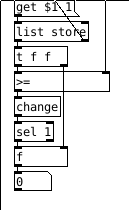
-
 oid
posted in technical issues • read more
oid
posted in technical issues • read more@Moothart [expr] also has some options here, rint, round, nearbyint, ceil and floor can round out the options. Open the help for [expr], and then the subpatch that is something like [pd all functions and operations] and then into the subpatch that is something like [pd misc numeric operations] for more info, going from memory on those subpatches. [i ] often works but it always rounds down, 0.999 will be 0 which can be irritating and not at all what you want. And you can stick the division right in there, [expr round($f1)/10]. [expr] is not as efficient as the normal math objects, generally we don't need to worry about this much with modern cpus unless you are using [fexpr~] or [expr~] in a subpatch with a small blocksize, but it is good to keep in mind and not just use it because it is easy.
-
 oid
posted in technical issues • read more
oid
posted in technical issues • read more@Moothart In this case it does not matter if it is the left or the right inlet and it would work the same. The general convention when something is patched as I did is that the connection does not cross inlets/outlets and is connected to the first it comes to since anything else would be ambiguous. Vast majority of those who patch like this, follow this convention.
Going to the right inlet it loads 0 into the float, than the [until] is banged sending [get 0 1( to [list store], the [until] then bangs until the [list store] gets an out of bounds get which sends a bang out of its right outlet to the left inlet of [until] which stops the [until]. Going to the left inlet the [f ] immediately outputs a zero which sends the [get 0 1( message to [list store], adds 1 to it and sends 1 to the right inlet of [f ], the [until] then starts and sends 1 out giving us [get 1 1(. Only difference between the two is that the [until] will bang one time less if you send [0( to the left inlet than it would if you send it to the right.
-
 oid
posted in technical issues • read more
oid
posted in technical issues • read more@Moothart It is just another slight variation on dripping lists, we just change the list we are dripping and how it is triggered.
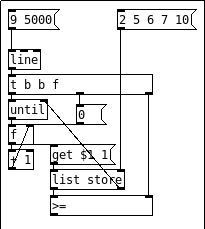
This is pretty much the same as @whale-av's solution but updated to use [list store] which was not around when list-abs was made. Most of the list-abs abstractions can be made more efficient with [list store], especially those ones which drip the list.Personally I find @jameslo's solution the best, most efficient (probably want to add in a [change] after the [int]) and cleanest. It is also a nicely circular with your misunderstanding of my initial response (assuming I understood you correctly and did not misunderstand), I have a fondness for that sort of ending up where you started path, tend to learn a lot from it despite the time spent going in circles.
-
 oid
posted in technical issues • read more
oid
posted in technical issues • read more@Moothart In the above example the array would only contain
2 5 6 7 10, so it would work as expected as long as the number are arranged sequentially from lowest to greatest, but [array] is not so good for this since it is a fixed size, [list store] is the better option here since it resizes itself to the list you give it.
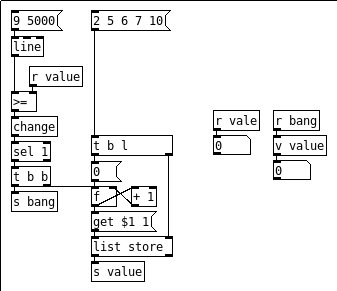
This little block of code built around the [list store] is called a list drip, this variant being the slow variety, every time it receives a bang it drips the next element of the list. The list drip is a very common and useful paradigm in pd, good one to learn and really understand since there are countless variations you can patch up for various needs. Here I am using a [s value] for the output which sets the right inlet of the [>=] and makes it easy to get the current value anywhere else in the patch through [r value] or [v value], each having their advantages and disadvantages. I also added a [s bang] which bangs after each time the value changes, which also can be useful. That [change] I added in after the [>=] is quite important and an oversight in my previous example.One thing to be aware of when using [v ], especially when you are also using [s ] to set that [v ], creation order can bite you.
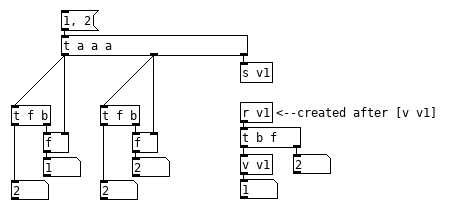
Pd sends the new value to the [r ]s and [v ]s in the order they were created and [r ]s often execute more code, if there is a [v ] in that branch of code the [r ] executes and that [v ] was created after the [r ], the [v ] will have the old value. Generally it is fairly easy to find these bugs once you understand how creation order affects [r ] and [v ], but it can be very difficult to sort out in large complex patches. The above patch also demonstrates the importance of using [trigger], it is generally wise to just use [trigger] anytime you need to connect more than one object to a single outlet, beyond being more reliable it also tends to make patches more readable and neater even in those situations where order does not matter and you can get away without using a trigger. -
 oid
posted in technical issues • read more
oid
posted in technical issues • read more@Moothart For the first question, just connect the outlet of [line] to the right inlet of [i ], bang the left inlet of [i ] when you want to sample the output. Checking for numbers is a bit more difficult since you can not be certain [line] will ever hit those numbers, it might go from 0.99 to 1.01 and never hit 1 but since you just want to know when it passes it, that is a bit easier. if the numbers in the array/list are always sequential as in your example it is pretty easy, you just need a [>=]->[sel 1] which goes into a counter that gets the next element from the list/array and dumps it into the right inlet of the [>=].
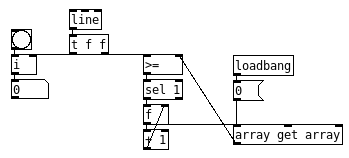
If this is not what you want, some more details about what you are trying to accomplish would help but someone else might see what you are going for. -
 oid
posted in technical issues • read more
oid
posted in technical issues • read more@stefano_zorzanello A copy and paste of that patch works fine for me and scanning through the text I don't see any issues, but I did not look closely. Did you save it as plain text? or just let the text editor decide the format? rtf or other fancy formats used by word processors might cause a crash. Here is the patch I get, maybe it will work if saving as plaintext does not work for you.
Untitled-1.pd -
 oid
posted in technical issues • read more
oid
posted in technical issues • read more@cfry Been playing with this today and reread the thread, I think we are mostly on the same track, in that previous post I just took a leap to a next step which seemed illogical to you but makes sense to me and might be a step you are not even interested in taking but it is almost free because of the stack. From what I understand, you want to have a sequence of commands which you want to step through, such as your valadd example in post 10, each time it gets a bang it adds that value to val and then loops infinitely the last three valadds; valAdd -1, valAdd -0.5, valAdd 1, goto 7, valAdd -1, valAdd -0.5, valAdd 1, goto 7, valAdd -1 etc. This would be like your [pi-cy] abstraction, sets val to 60, and then steps through each valAdd and finishing with that infinite loop between line 7 and line 9 with each step sending the result of val + valAdd's argument to SynthY's pitch? The loop command would be closer to [pi-cy] than this goto? or maybe loop would be the [cy%...] abstractions? Hopefully it is close enough for this example.
Assuming I got this down, the leap to the next step I took was to to just stick the entirety of your previous screen shot into one instance of this abstraction so you don't need dozens of text files to keep track of jumping between editing the patch and the texts, and things like sharing data between them, your groups, and a whole lot more, become trivial. The difference between the single instances for each channel and putting all this into one instance is just adding a few commands, the stack makes it easy to expand and develop things like this. But you may not want to go that way and may not even need the stack, a different data structure like a list or an array might suit your needs better and it is easy to switch this all over to a different data structure, pop and push just set and get a value from the list or array instead of literally popping and pushing. Or we can implement lists/arrays in the stack based paradigm and that is when things get fun, but that might be more than you want.
I worked out a few variations but I will wait to post them until I am certain I understand what you are going for so I can make any needed adjustments and hopefully avoid more confusion.
-
 oid
posted in technical issues • read more
oid
posted in technical issues • read more@cfry I don't think you did, but maybe? Either way, no need to apologize, I have gotten a lot of good ideas for my own projects from this, simplifying my way of doing this stuff for you has been very productive for me. Is loop now working? it looks good but I did not test it. Also, sending 200 to $0pop is not a good way to clear the stack, if the last command run was something which pushes onto the stack you will end up with something still on the stack, just connect a [r $0-dump] to the right inlet of the [list store] and you can send the dump command to clear it.
-
 oid
posted in technical issues • read more
oid
posted in technical issues • read more@cfry Slow is fine with me and I am generally not going to exceed a post a day anyways unless I can just give a quick answer that I don't have to think about much. So the output of [r chs-$0] is a two element list, channel number and a one or a zero? What is the right outlet of your once? bang when reset or something else? are they how you are implementing groups? this screen shot is one group with two synths? I think I got a bit hungup on the tracker aspect and was not quite seeing what you were trying to do. We should get this sorted out quite nicely after a bit of a Q&A and get you a more flexible and dynamic setup in the process.
-
 oid
posted in technical issues • read more
oid
posted in technical issues • read more@cfry I think variables might be the best way to go about this even though they do not give you your easy to read argument, but you can just use the name of the text to show that and have the text as an argument? You could also use a single text for all instances, have each one execute just the code that is relevant to them, this has the advantage of keeping it all in one place and you will never have to remember what was in the other texts but you could end up having to scroll a whole lot more. Could also go with a startup script which all instances in a patch would run at startup, a way to setup the environment and create globals, setup initial state of each, load programs into them, etc. Having a master instance which controls the rest might is also a possible solution, like the control track some trackers have, it would be able to feed each instance shared values and then they would react on that data as their code tells them. Other solutions I have come up with move things away from the tracker style and towards it being a scripting language, so it would greatly change how you interact with the abstractions and your entire workflow, which I am not sure you want to do?
I should have time to get my computer setup tomorrow so I can get back to patching, on Friday or Saturday (assuming thing go well with the computer) I will throw a few demos together for you to play with so you can get a better idea.
Or maybe just have arguments be code, at startup each instance runs their arguments, then you could do numbered groups with an if statements or a case statement, that would probably work best with the startup script idea so you don't have to have the exact same thing repeated in every instance.
-
 oid
posted in technical issues • read more
oid
posted in technical issues • read more@soundproofskin That makes sense since pd's text editor is the Tk text widget and it has those features, have not used the editor since I made my abstraction to get around other issues with the text editor.
I am not sure if we can add this in with a plugin, the binding is not an issue but we also need to retrieve the text of the object currently being edited so we can find that next space to navigate too when shift-right is pressed, and I have not found a way to do that, only the last object clicked on, which means this would not play well with autopatching. If we can get the current object these features would be simple to implement, maybe @seb-harmonik.ar knows of a variable holding the value of the current object being edited or an array holding the text currently being edited? I have a vague memory of once finding such an array, but it is not in my notes and the one time I tried to find it again I came up empty.
You could easily bind it to move the insertion cursor a fixed number of characters, shift-right moves the cursor 4 or 5 characters to the right, but I don't think that would be much use since to get good with it you would have to constantly count characters. One of the other flavors of pd (plugdata, purrdata, pd-ceammc, pd-l2ork) might provide this if using one of them is an option but as you progress and get better with pd, i am not sure you will find much utility in navigating text this way; years ago I also used to try and shit-arrow my way through objects but as I became more familiar with pd it became rare there was a need, anytime I want the cursor somewhere other than at the end is when I am editing an object which is not currently selected so I have to use the mouse anyways and putting the cursor where I need it is less work than keyboard navigation.
-
 oid
posted in technical issues • read more
oid
posted in technical issues • read more@soundproofskin Pd's built in text editor seems a low priority and just a convienence that is not meant to replace a proper editor. I have an abstraction which you use in place of [text define] and instead of opening the internal editor it opens the text in an external editor and reloads the text anytime it is saved, I will upload it later this week after I get some computer stuff sorted out.
-
 oid
posted in technical issues • read more
oid
posted in technical issues • read more@cfry The variables are much simpler than they look and the general technique I used to implement them is a very useful one, you can also use it to implement arrays and even functions.
Completely forgot about midi groups, your idlewait subpatch now makes sense. Believe I am going to think on this one a bit, the way I deal with such things would be to use tracky for generating the modulation tracks ahead of time instead of playing/creating them in realtime so I can do everything in a single instance, but I don't think this is the solution for you? you want something you can interact with more directly? You seem to be going more towards a sequencer/programming language hybrid, which seems fun, especially when you bring in multiple instances. I think implementing basic namespaces is probably ideal, and this would allow you to change which group something is a member of on the fly or have them be members of multiple groups, redefine groupes, lots of stuff. I will play around with this at work tonight, you have given me lots of fun ideas.
Wrong select on your loop, you had that right the first time. Put a [t b f] on the right outlet of [sel 0 -1], float outlet goes to [sel] and bang outlet bangs the float. Make sure to click on that [0( message if you are not starting from the freshly opened patch, who knows what the value is otherwise. And remove your [>=] logic, but there is something to be said about using [>=] instead of the plain select as I did, you would not have to worry about clicking the [0( if things get out of whack but once you have it working it should never get out of whack so I tend towards going with the slightly more efficient option in this case. Also make sure the counter is wired proper, it needs to do the +1 before the [selec 0 -1] or it won't work, a [t f f] is not a terrible idea here, old habits. I probably was not as clear as I could have been on that, have yet to get my new computer setup and have been using my tablet or phone, which are not great for this stuff, especially since I can't get the linux VM on my tablet to share files, so can't get patches in or out of the VM where pd lives without jumping through hoops. Should be up and running this week.
-
 oid
posted in technical issues • read more
oid
posted in technical issues • read more@cfry said:
The problem that arise is that when I start to improvise I kind of "break the (your) concept". And I would like to avoid ending up in another patch that is so messy that I can not use it if I bring it up after a half a year or so. Lets continue working on it!
You are definitely getting parts of it and seeing how to develop it but there are parts you don't quite have yet and I can't quite identify what those are so I can explain things. I made a sizable patch that adds a lot of commands but last night I realized I went to far and it would probably confuse things for you, so I will reduce it down to just the things you mentioned, I will follow your lead.
Passing the text name as an argument is just a matter of using your dollar arguments, [text get $1], but you will want to tweak your input for text symbols some.
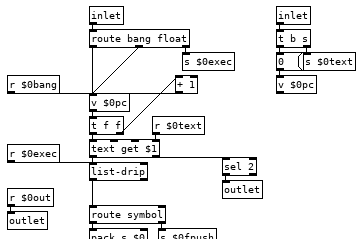
So our right inlet for text symbols goes to a send now so we can easily access that text anywhere in the patch, like in our commands, and we also reset the counter which uses a value for its float for the same reason, we will want to be able to access and change its value from commands. "pc" is short for program counter and it is important that we increment its value before sending a float to the text get otherwise if we change its value in some command it will get overwritten, so having a [t f f] here is almost a must. This also means that [v $0pc] points to the next line to be run and not the one that is currently being run, this is important, fairly useful, and occasionally irksome.The left inlet has change some as well, we have a [route bang float], bangs and floats go to the counter so we can increment the program or set the next line to be run, the right outlet sends to our [list-drip] which enables us to run commands from the parent patch so when things don't work you can run that print command to print the stack and get some insight or just run commands from a listbox to test things out or whatnot. We also have [r $0bang] on the counter, this lets us increment the counter immediately from a command and start the next line. And finally we have a new outlet that bangs when we reach the end of the text file so we can turn off the metro in the parent patch which is doing the banging, reset the counter to zero, load a new program, or what ever you want to do when the program completes. Middle outlet I did away with, globals can be done as a command, as can most everything.
Variables we can implement with some dynamic patching and a simple abstraction to create the commands for setting and getting the value of any variable.
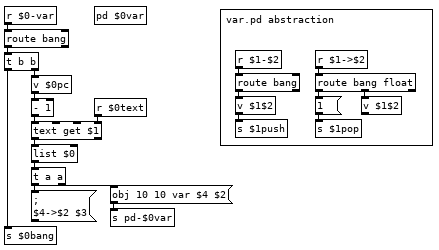
This looks more complicated than it is. If we have the linevar val1 10in our program it runs thevarcommand which bangs [v $0pc] and subtracts 1 from it to get the current line from the text holding our program and then appends our $0 to it giving us the listvar val1 10 $0. The first message it goes to creates an instance of the var.pd abstraction in [pd $0var] with the second and fourth elements of the list as arguments, val1 and $0. Second message sends $3 to $4->$2, 10 to $0->val1. To finish off we use that new $0bang receive to bang [v $0pc] so we don't execute the rest of the line which would runval1pushing 10 to the stack and then push another 10 to the stack. Variable name with a>prepended to it is the command for setting the value of a variable,22 >val1in your program would set the value of val1 to 22,val1would push 22 to the stack. If we could see how pd expands all those dollar arguments in the abstraction it would look like this:
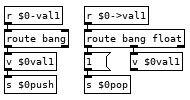
Now you can create as many variables as you would like in your programs and a couple tweaks you can have the abstraction global.pd and subpatch [pd $0globals] so you can have the lineglobal val2 0and get a global variable that all instances of tracky can read and write from. There are a couple catches, each variable definition must appear on its own line with nothing else after it and with our simple parsing there is nothing to stop you from creating multiple instances of the same variable, if you run the linevar val1 10a second time it will create a second abstraction so when you runval1it will bang both and each will push 10 to the stack giving you an extra 10 and screw up your program. We can fix this with adding a registry to the var command which searches a [text] to see if it has been created already, something like this after the [list $0] should do it:
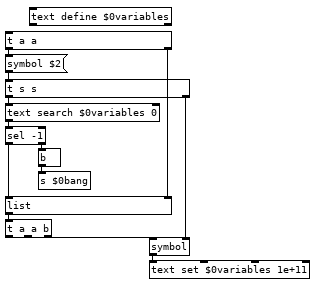
And you will want to create a command to clear all variables (and the text if you use it) by sending [clear( to [pd-$0var], or get fancy and add another command in var.pd which bangs [iemguts/canvasdelete] so you can delete individual variables. Using [canvasdelete] has the advantage of not needing a registry for variables, you can just always run ```delete-<variable name>, or what ever you name your delete command, before creating a new variable. Each method has advantages.Your loop does not work because the unpack needs to go into the left inlet of the float, that triggers the first loop and causes it to go back, each time the program gets back up to the loop command it increments [v $0loopi] until the select hits the target number of loops which sets $0loopi to -1 which ends the looping.
Not sure what you mean by groups/exclusive groups, can you elaborate or show it with a patch?
None of the above has been tested, but I did think them through better than I did the loop, fairly certain all is well but there might be a bug or two for you to find. Letting you patch them since we think about how things work more when we patch than when we use a patch. Try and sort out and how they work from the pictures and then patch them together without the pictures, following your understanding of them instead of your memory of how I did it. And change them as needed to suit your needs.
-
 oid
posted in technical issues • read more
oid
posted in technical issues • read more@whale-av said:
A recent change (since the doc was written).
That doc was written 20 years ago, back when pd was 9 years old, not sure I could call it recent but it gave me a chuckle, getting old. it goes back to at least 0.47 when I returned to pd and finally started to learn it proper and not treat it like digital modular synth. I don't think we could use this in dynamic patching until they sorted out escapes, vague memory that back when scriptit was released and i really dug into dynamic patching, this did not work.
